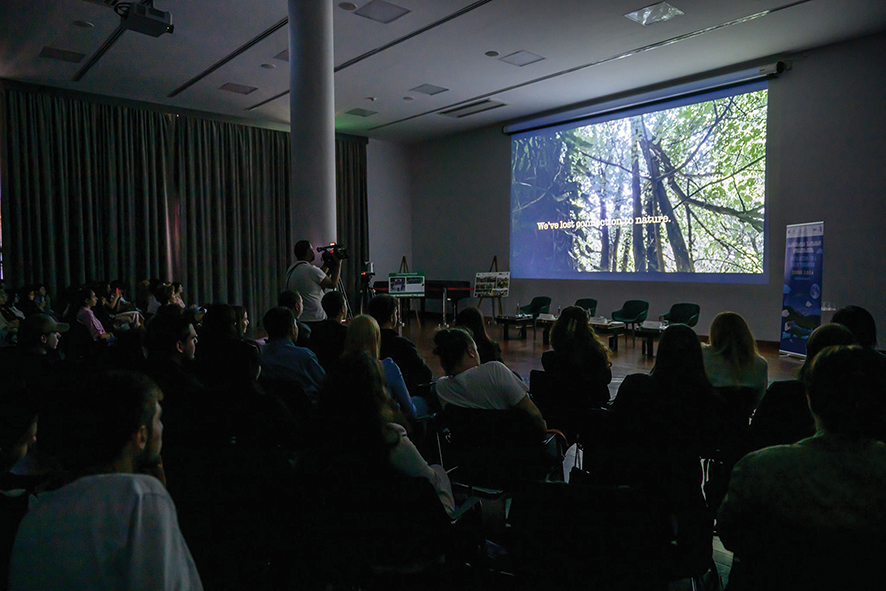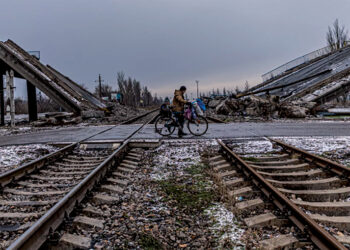Climate change is on the radar for many Georgian youths, but there is always an opportunity to further educate those who don’t know about it, says Climate Ambassador Rezi Dgebuadze.
Dgebuadze is an 18-year-old who is involved in various initiatives in Georgia to combat climate change. During the event ‘Youth Action for a Safer Tomorrow,’ held on October 3 by the United Nations Development Program (UNDP) and the Environmental Information and Education Center of Georgia’s Ministry of Environmental Protection and Agriculture, young people from across Georgia came together to talk about the initiatives they are participating in to push their country toward a more climate-focused future.
The event saw discussions held and the screening of a short film documentary, ‘Thank You for This World,’ created by Rezi Dgebuadze and Karen Cirillo, the digital communications specialist at the UNDP Istanbul Regional Hub. The documentary portrays the hopes and concerns youth have with the future, once the world has been further affected by climate change.
GEORGIA TODAY talked with Dgebuadze about his climate change initiatives and his and Cirillo’s documentary.
When were you first exposed to the problem of climate change?
When I first heard about it, I was 15. They taught us something at school, but not very much. They didn’t emphasize how big of a problem it was and how shared the problem was globally. At the time, I was also introduced to non-formal education, which played a huge role in my learning about the climate change problem. The courses, projects, and activities, for example, at the Environmental Information and Education Center, where I have a long history, are where I was introduced to the basics of environmental protection and climate change.
What’s your experience with the ‘Youth Climate Ambassadors’ summer camp?
I participated in it for the first time in 2022. It’s an annual green camp that’s held in collaboration with UNDP Georgia and the Environmental Information and Education Center. The thing about climate change is it’s really sustainable. The camp teaches youth, school students, from all over the country, how to write and develop a project and then launch it. So, after ten days of green camp, these groups that are formed continue advocating and raising awareness about climate change, and that’s a spectacular thing. I don’t remember anything at this level of sustainability happening in Georgia before.
It’s up to the individual groups as to how long their project will last, but most choose one year. Also, most of the information students learn during green camps is about climate change, which they take and teach to other students in their high schools. Most projects are about raising awareness, advocacy, and making campaigns for eco-friendly things.
Tell us about the regional network ‘Generation Nexus.’
It’s a youth network in the region, including Eastern Europe, Central Asia, and the South Caucasus. It’s not a big network in terms of quantity; there are only two coordinators from Georgia. The network is moderated by the UNDP Istanbul Regional Hub, and our main goal is to empower youth from this region. We have done some projects, like photography, and we also take part in regional conferences because youth need to be heard. Generation Nexus includes many youth activists, who are not only focused on climate change, but also on human rights, health care, energy, and other sectors.

Why did you decide to make a documentary?
Video is the most powerful tool to attract and engage people on social media. Since we needed to incorporate social media into our work with Generation Nexus, we thought about doing a documentary. But we didn’t want a classical documentary that incorporated information about climate change and numbers and stuff like this – that has been done a million times. I started thinking about how to create a film that incorporated emotions and feelings. We wanted to show emotions and portray how the youth see this global problem and engage with it. Everyone knows that people from high schools and universities are not yet professionals, but they understand this problem well.
The film finishes with hope. We took inspiration from the poem ‘Thanks’ written by American Poet W.S. Merwin. The poem is really sad and pessimistic about things mankind has done to the climate, but we took the positive side of it.
How can other youth be empowered, and where can they start on their path to helping Georgia become more climate-focused?
That was one of the goals we wanted to achieve with this short film. It’s good that this amount of youth is empowered and wants to do something, but how can we engage more in this good work? Emotions are the thing to concentrate on when working with youth, because if you don’t connect with them emotionally and don’t tell them something touching, it’s usually hard to engage them. After that, you can go on with raising awareness and education and giving them the basics. I’m talking from my own experience, because when I found out about it, I wanted to learn about it more. It’s like a chain reaction. You attend one course, and you want to attend more and more to get as much information as possible.
In Georgia, we have a lot of youth who see this problem, and the nice thing is, it doesn’t matter what profession someone chooses or what interests or hobbies they have, they all see this as a big deal and want to work on it. It’s hard to change your lifestyle, it’s a problem we often stumble upon but that’s why we work to make things greener.
What are ongoing projects by youth in Georgia to engage communities in this topic?
“People might expect that it’s all the same – advocacy and raising awareness – but all the groups take different paths to how they do this. One group, their project was really special: they incorporated Roblox, the game, into the engagement of youth. They assimilated climate-driven disasters, droughts, heavy rains, etc., into a game and made it public. It’s a really creative way of using digital tools. My group and youth organization made animations for campaigns, including those for the new year against fireworks.
“Most of the youth climate ambassadors, and other volunteers of the Environmental Information and Education Center, have the right modules, tools, presentations, and research, from UNDP and the Ministry of Environment and Agriculture to educate youth. They are ambassadors in their high schools and municipalities. This engagement continues to grow and grow. It’s really nice to see the youth organizations formed from the green camps – there are so many in different municipalities and all this good work is being done across the country.”
Dgebuadze gave special thanks to Karen Cirillo because “creative collaboration is what this short film brought to us and the audience,” he noted.
The ‘Youth Action for a Safer Tomorrow’ was supported by the Green Climate Fund, the Swedish International Development Cooperation Agency (Sida), and the Swiss Agency for Development and Cooperation (SDC). The UNDP has a climate program in Georgia, supported by the Green Climate Fund and the governments of Georgia, Sweden, and Switzerland, that is a seven-year initiative aimed at implementing disaster risk management systems across the country.
By Shelbi R. Ankiewicz














